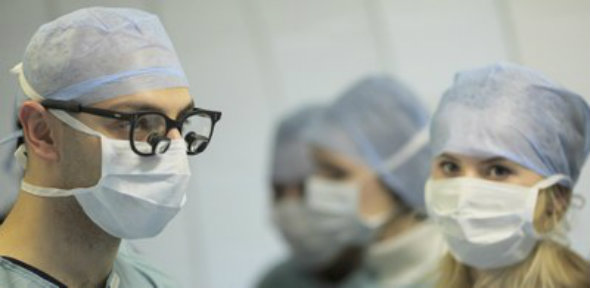Patient services, treatment and care is provided by a multi-discipline team, which consists of oncologists (specialist cancer doctors), additional consultants from other medical disciplines and a wide range of ancilliary staff.
The types of staff involved are listed in alphabetical order:
Clinical trials team
This team of doctors, scientists and nurses co-ordinate the clinical trials carried out in the Oncology Department. They collect information about patients, including how well they have tolerated treatments, and their long-term results.
Dieticians
Dieticians provide dietary advice and if necessary can arrange special diets or nutritional supplements. This is important, as your condition and/or its treatment might affect your appetite which could impact on your health and well-being.
Doctors (Oncologists)
Consultants (or honorary consultants if they are also carrying out research in the University) are the most-experienced doctors. In the Oncology Centre, day-to-day care of patients on the wards and in the clinics is undertaken by a number of specialist registrars, senior house officers and house officers. In clinic, you might be seen by a registrar rather than your consultant, depending on the consultant's availability.
There are 3 main types of Oncologists:
- Clinical oncologists: Deliver systemic treatments, such as chemotherapy, hormone therapy and radioisotopes and administer radiotherapy to treat patients with both curative and palliative aims.
- Medical oncologists: Provide the same treatments as a clinical oncologist, but do not administer radiotherapy.
- Surgical oncologists: Specialise in the surgical management of cancers.
Oncologists may also have a specialist interest and expertise in the management of particular types of cancer, e.g. gastrointestinal tract cancers or urological cancers:
- Gynecological oncologist:
Focuses on the diagnosis and treatment of cancers of the female reproductive system, including ovary, endometrium, uterus, cervix, vagina, vulva and trophoblastic disease.
- Haemato-oncologist:
Diagnose and treat cancers of the blood and lymphatic system. These include myeloma, lymphomas, Hodgkin’s disease, chronic lymphatic leukaemia, and acute and chronic leukaemias.
- Histopathologist:
Identify which type of cancer a patient has and at the stage of disease progression, by microscopic study of body tissues and cells obtained by surgeons through biopsy procedures.
- Paediatric oncologist:
Concerned with the diagnosis and treatment of cancer in children.
- Palliative care specialist:
Provides care for patients whose illness cannot be cured. This includes management of pain and other symptoms and provision of of psychological, social and spiritual support. The goal of palliative care is achievement of the best quality of life for patients and their families, from diagnosis, through treatment, to cure, continuing illness or death and into bereavement. Many aspects of palliative care are also applicable earlier in the course of the illness in conjunction with other treatments.
- Radiation oncologist:
Specialises in the study and application of imaging technologies, such ultrasound, computed tomography (CT) Computed Axial Tomography, nuclear medicine, Positron Emission Tomography (PET) and magnetic resonance imaging (MRI)) to diagnose or treat cancers.
Macmillan nurses
Macmillan Nurses specialise in cancer care, providing guidance and support for patients and their families through the various stages of their illness. They are funded by Macmillan Cancer Relief.
Medical physicists
The radiotherapy facilities in the Oncology Centre are supervised by Medical physicists, who also assist in giving some forms of radiotherapy.
Nurses
Nurses within the Oncology Service Centre look after patients, their families and carers. Nurses working in the inpatient wards are responsible for providing care for patients who require admission to hospital for their treatment. Nurses working in the Outpatient Department are responsible for co-ordinating outpatients clinics, administering chemotherapy and supervising other treatments within the Oncology Day Unit. A number of highly experienced specialist nurses or nurse practitioners also work within the Outpatient Department.
Pharmacists
Pharmacists supply medicines for inpatients and outpatients and are also responsible for preparation of chemotherapy treatments. The Oncology Centre contains a special Chemotherapy Pharmacy.
Phlebtomists
Patient blood samples, both on the wards and in outpatients clinics, are taken by Phlebotomists (and also nurses and doctors).
Physiotherapists
Physiotherapists work on the wards to maintain patients’ fitness and help them to overcome disability.
Radiographers
Radiographers administer radiotherapy treatment. Each radiotherapy machine is operated by a team of radiographers who will assist and support you. Radiographers also operate the simulator, which is used for planning treatment.
Research nurses
The role of a research nurse is to help medical staff co-ordinate clinical trials. They ensure that patients receive adequate information to allow them to make an informed decision about their treatment, they supervise some aspects of the treatment provided and collect the information required by those conducting clinical trials (including participating pharmaceutical companies).
Ward clerks
Ward clerks are responsible for supervising patient records on the wards and organising any follow-up appointments.

